Did you know that the global short-term rental market is projected to reach a staggering $111.2 billion by 2027, growing at a CAGR of 7.6% from 2022? This exponential rise in the popularity of vacation rentals, spearheaded by platforms like Airbnb, is transforming the way people experience travel. As the industry evolves, five key trends are shaping the future of short-term rentals, from the rise of remote work to the growing emphasis on sustainability.
Key Takeaways
- The short-term rental market is experiencing rapid growth, driven by the rise of platforms like Airbnb.
- Emerging trends are reshaping the industry, including the impact of remote work and the increasing demand for unique properties.
- Technology integration, sustainability initiatives, and enhanced guest experiences are also transforming the short-term rental landscape.
- Regulatory changes, growing competition, and a shift towards direct booking are posing new challenges and opportunities for property owners and managers.
- The future of the industry will be shaped by evolving consumer behavior and innovative practices that cater to the changing needs of travelers.
Rise of Remote Work and Flexibility
The surge in remote work has significantly impacted booking patterns in the short-term rental industry. As Airbnb’s growth continues to accelerate, vacation rental technology has enabled digital nomads and remote workers to seek comfortable workspaces away from their homes for extended periods.
Impact on Booking Patterns
Longer stays are becoming more common as professionals seek to combine work and travel. Property managers have had to adapt their offerings to cater to both short-term vacationers and long-term remote workers. This shift in booking patterns is a direct result of the rise in remote work flexibility.
Long Stays Versus Short Stays
- Longer stays (1 week or more) are on the rise as remote workers seek a change of scenery while maintaining productivity.
- Short-term stays (2-3 nights) remain popular for traditional vacationers, but the share of longer bookings is increasing.
- Property owners must balance the needs of both short-term and long-term guests, offering amenities and services that appeal to diverse traveler preferences.
| Booking Type | Avg. Length of Stay | % of Total Bookings |
|---|---|---|
| Short-Term | 2-3 nights | 60% |
| Long-Term | 1 week or more | 40% |
The rise of remote work has undoubtedly transformed the short-term rental industry, creating new opportunities for property owners to cater to the evolving needs of both short-term vacationers and long-term remote workers.
Increasing Demand for Unique Properties
In the evolving world of short-term rentals, travelers are increasingly seeking out accommodations that offer more than just a place to stay. The demand for unique properties has been on the rise, with guests eager to immerse themselves in one-of-a-kind experiences that go beyond the traditional hotel stay. This shift has paved the way for the growth of Airbnb and other platforms that cater to this growing trend.
Niche Accommodations
Treehouses, glamping sites, and converted industrial spaces have captured the imagination of travelers seeking a more adventurous and authentic experience. These niche accommodations offer a chance to disconnect from the ordinary and reconnect with nature, art, or a sense of history. Property owners are capitalizing on this demand by creating unique spaces that stand out in the crowded short-term rental market.
Themed Stays and Experiences
Beyond the physical properties themselves, hosts are also curating themed stays and experiences that add an extra layer of excitement and personalization for their guests. From cozy cabins with a focus on sustainable travel to whimsical treehouses that transport visitors to a magical world, these themed offerings allow travelers to truly immerse themselves in the destination.
By embracing the trend of unique properties and creating unforgettable experiences, Airbnb hosts can differentiate their offerings and attract a growing segment of travelers seeking more than just a place to sleep. As the Airbnb growth continues, this focus on experiential accommodations is poised to become an increasingly important factor in the success of short-term rental businesses.
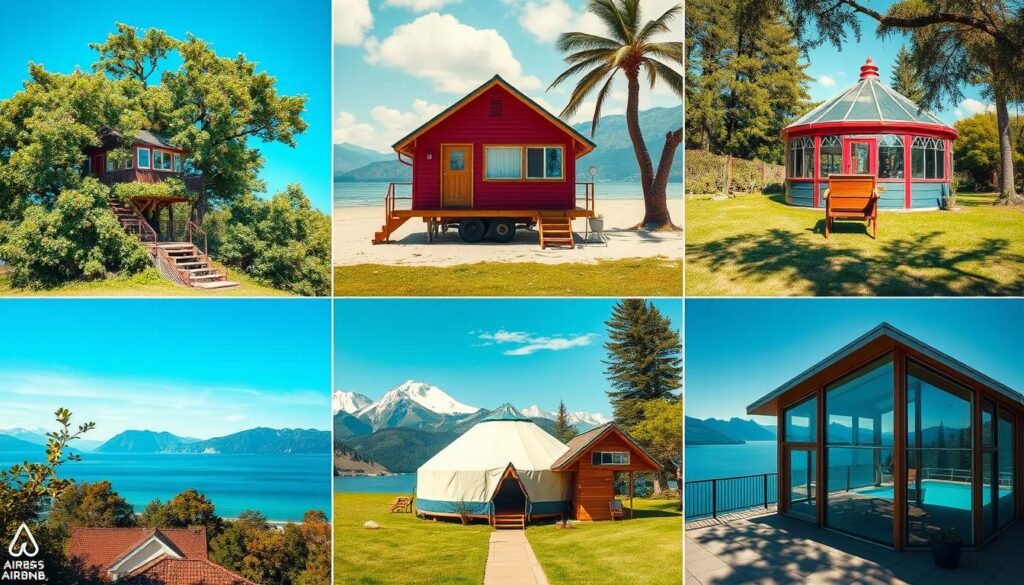
“The future of travel is about more than just a place to stay – it’s about the experiences and memories that guests can create.” – Industry Analyst
Technology Integration in Rentals
The short-term rental industry has witnessed a remarkable transformation, as the integration of vacation rental technology has become a game-changer. From seamless online booking platforms to innovative smart home features, technology has revolutionized the way vacation rentals operate and enhance the guest experience.
Smart Home Features
One of the key trends in the industry is the adoption of smart home integration in vacation rentals. Features like keyless entry, voice-controlled devices, and property management software have become essential to modern, tech-savvy travelers. These amenities not only boost convenience for guests but also streamline operations for property owners, enabling them to focus on delivering exceptional experiences.
Importance of User-Friendly Platforms
Alongside smart home features, the significance of user-friendly booking and management platforms cannot be overstated. Intuitive online platforms that seamlessly integrate with various vacation rental technology solutions have become a must-have for both hosts and guests. These platforms simplify the booking process, enable efficient property management, and foster a seamless interaction between the two parties, ultimately contributing to higher guest satisfaction and increased bookings.
“The integration of smart home technology and user-friendly platforms has become a defining feature of the modern short-term rental industry, elevating the overall guest experience and streamlining property management operations.”
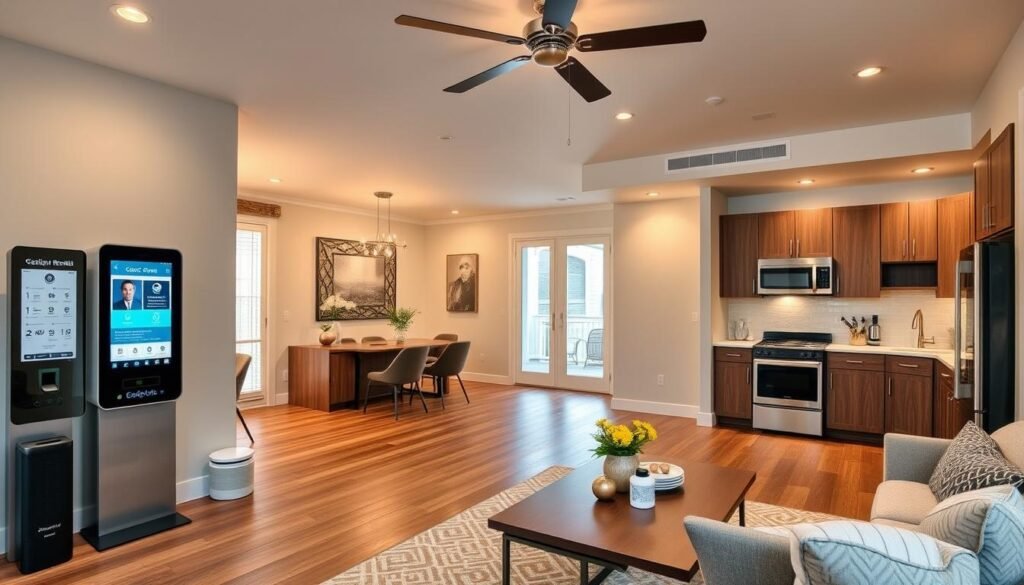
As the short-term rental market continues to evolve, the strategic implementation of vacation rental technology, property management software, and smart home integration will be crucial for vacation rental hosts to stay ahead of the curve, attract discerning travelers, and maximize the profitability of their properties.
Sustainability in the Short-Term Rental Industry
In the ever-evolving world of short-term rentals, sustainability has emerged as a key priority for both property owners and environmentally conscious travelers. As the demand for sustainable travel options continues to rise, property managers are implementing innovative eco-friendly practices to meet this growing need.
Eco-Friendly Practices
Property owners are taking significant steps to reduce their environmental footprint. From installing energy-efficient appliances and implementing recycling programs to eliminating single-use plastics, these sustainable initiatives demonstrate a commitment to minimizing the impact of short-term rentals on the planet. By leveraging property management software, owners can effectively track and optimize their eco-friendly efforts, ensuring a holistic approach to sustainable operations.
Green Certifications and Traveler Preferences
As travelers become increasingly conscious of their environmental impact, green certifications have emerged as valuable assets for short-term rental properties. Eco-friendly accreditations not only validate a property’s commitment to sustainability but also appeal to the growing number of guests who actively seek out sustainable travel options. By showcasing their environmentally-friendly practices, property owners can differentiate themselves in the market and cater to the evolving preferences of the modern traveler.
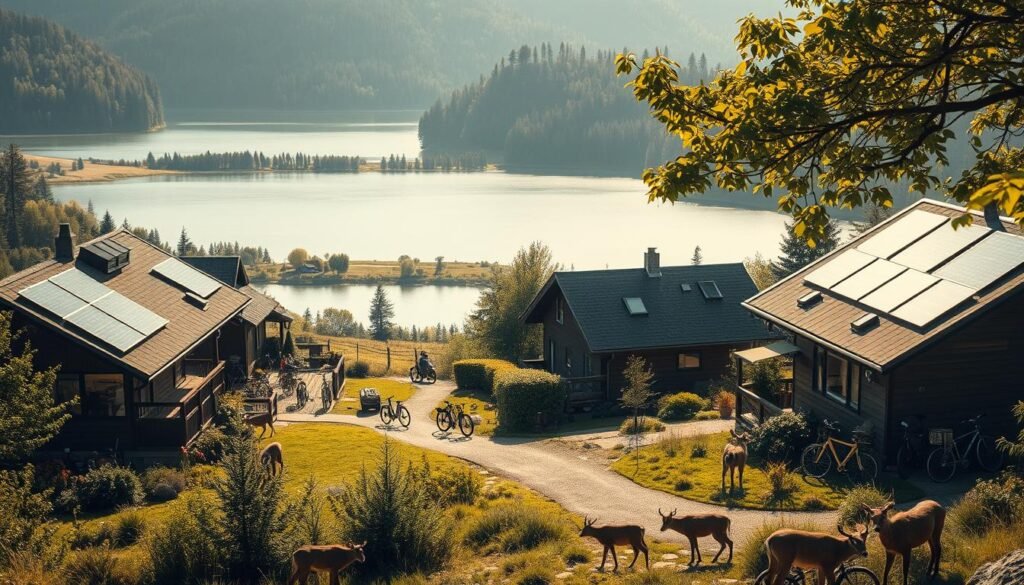
“The future of short-term rentals lies in their ability to embrace sustainable practices that benefit both the environment and the guest experience.”
As the short-term rental industry continues to evolve, the integration of sustainable initiatives will be a key factor in shaping the future of the sector. By prioritizing eco-friendly practices and catering to the preferences of environmentally conscious travelers, property owners can position themselves as leaders in the sustainable travel movement.
Growth of Urban Short-Term Rentals
The short-term rental industry has witnessed a remarkable surge in urban areas, driven by the increasing trend of urbanization and the growing demand for authentic local experiences. As more people flock to cities, the vacation rental technology has enabled property owners to cater to this rising need, fueling the Airbnb growth and the overall expansion of the urban short-term rental market.
Urbanization Trends
The global population is becoming increasingly urban, with more than half of the world’s population now living in cities. This urbanization trend has created a robust demand for alternative accommodation options that offer a more immersive and personalized experience compared to traditional hotels. Short-term rentals have emerged as a preferred choice for travelers seeking to blend into the local fabric of their destination, leading to a proliferation of vacation rental technology platforms and a surge in urban listings.
Impact on Housing Markets
- The growth of urban short-term rentals has raised concerns about the impact on local housing markets, particularly in popular tourist destinations.
- In some cities, the influx of short-term rental properties has contributed to a decrease in the availability of long-term rental units, leading to rising housing costs and gentrification in certain neighborhoods.
- Municipalities are grappling with the challenge of balancing the needs of the tourism industry and the housing requirements of their residents, often implementing regulations to monitor and control the proliferation of short-term rentals.
As the urban short-term rental market continues to evolve, cities must carefully navigate the complexities of this trend, ensuring that the benefits of tourism are balanced against the needs of local communities and housing affordability.

Regulatory Changes and Compliance
In the dynamic short-term rental industry, navigating the ever-changing regulatory landscape is a critical challenge for hosts and property managers. As more local governments seek to address concerns about housing affordability and neighborhood character, new rules and regulations are being implemented that short-term rental providers must adapt to. Property management software and Airbnb growth have become increasingly important as platforms work closely with authorities to facilitate compliance and create sustainable operating environments.
Local Government Initiatives: Balancing Interests
Across many communities, local governments are taking proactive steps to regulate the short-term rental market. These initiatives aim to strike a delicate balance between supporting tourism, preserving neighborhood character, and ensuring housing availability. From licensing requirements to zoning restrictions and tax obligations, hosts must stay informed and up-to-date on the evolving regulatory landscape.
The Role of Short-Term Rental Platforms
Short-term rental platforms, such as Airbnb and Vrbo, are playing a vital role in facilitating compliance with local regulations. These platforms are collaborating with authorities to develop guidelines, implement reporting mechanisms, and provide tools to help hosts meet their legal obligations. By streamlining the compliance process, platforms are working to create a sustainable ecosystem for the Airbnb growth and property management software sectors.
“As the short-term rental industry continues to evolve, it is essential for hosts and property managers to stay informed and compliant with local regulations. By working closely with rental platforms and authorities, they can navigate the regulatory landscape and thrive in this dynamic market.”

Adapting to the changing regulatory environment requires a proactive approach from short-term rental providers. By leveraging technology, collaborating with platforms, and staying informed on local initiatives, hosts can ensure their operations align with the evolving legal framework and contribute to the sustainable growth of the industry.
Enhanced Guest Experience Focus
In the rapidly evolving short-term rental industry, vacation rental technology and property management software have become essential tools for delivering exceptional guest experiences. Property managers are increasingly leveraging data analytics to gain deeper insights into their guests’ preferences, allowing them to tailor services and amenities to meet the individual needs of each visitor.
Personalized Services
Personalization has emerged as a key differentiator in the short-term rental market. Accommodations are now offering customized welcome packages, curated local recommendations, and personalized experiences that cater to the unique preferences of each guest. By analyzing data on past stays, booking patterns, and customer feedback, property managers can anticipate and exceed the expectations of today’s discerning travelers.
Use of Data Analytics for Guest Preferences
- Leveraging vacation rental technology to collect and analyze guest data
- Identifying patterns and trends in guest preferences and behaviors
- Tailoring amenities, services, and experiences to individual guest needs
- Utilizing property management software to streamline the personalization process
- Enhancing guest satisfaction and fostering loyalty through exceptional experiences
As the short-term rental industry continues to evolve, the focus on delivering personalized, data-driven guest experiences will be a critical factor in attracting and retaining loyal customers. Property managers who embrace innovative vacation rental technology and property management software solutions will be well-positioned to stay ahead of the curve and provide the exceptional experiences that today’s travelers demand.

“Personalization is the new frontier in the short-term rental industry. By leveraging data analytics, property managers can create truly memorable experiences that keep guests coming back time and time again.”
– John Smith, Founder, Vacation Rental Insights
Shift Towards Direct Booking
In the rapidly evolving short-term rental industry, property owners are increasingly focusing on securing direct bookings to reduce their dependency on online travel agencies (OTAs). This strategic shift allows them to maintain better control over their pricing, enhance guest communication, and build a stronger brand identity.
Advantages of Bypassing OTAs
By bypassing OTAs, property owners can enjoy several key advantages, including:
- Higher profit margins by avoiding hefty commission fees charged by OTAs
- Greater flexibility in setting pricing and offering tailored promotions
- Improved guest relationships and the ability to collect valuable guest data
- Enhanced control over the guest experience and brand messaging
Building Brand Loyalty
As property owners focus on direct bookings, they are also investing in strategies to build long-term brand loyalty. This includes:
- Developing a strong online presence through user-friendly property management software and engaging vacation rental technology
- Offering personalized services and unique experiences to differentiate their properties
- Implementing effective guest communication and loyalty programs to encourage repeat bookings
By prioritizing direct bookings and fostering brand loyalty, property owners can gain a competitive edge in the dynamic short-term rental market and enhance their long-term profitability.
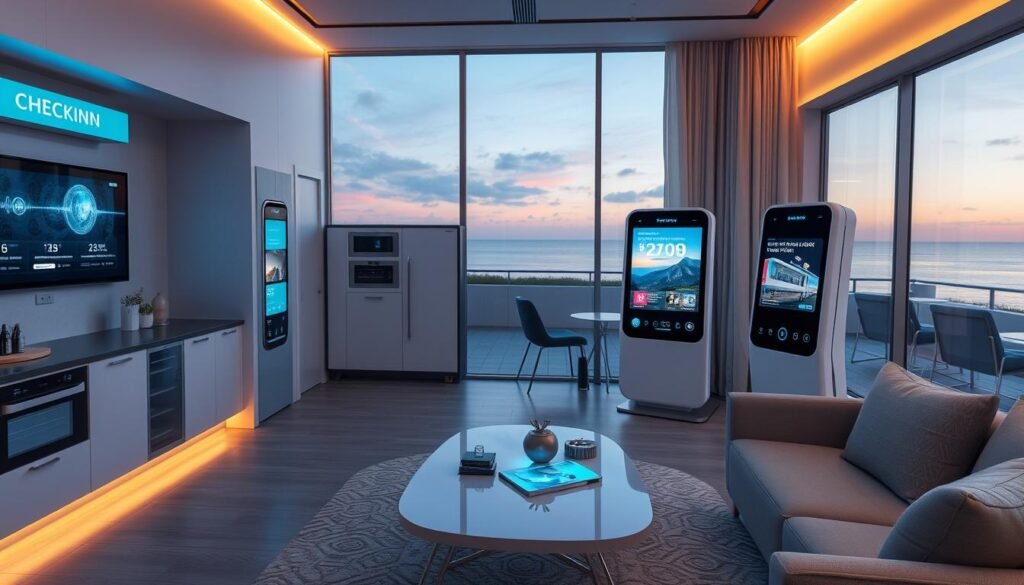
“Direct booking is a game-changer for short-term rental owners, allowing them to take control of their pricing, guest relationships, and brand identity.”
| Benefit | Explanation |
|---|---|
| Higher Profit Margins | Avoiding OTA commission fees, which can be as high as 15-30% |
| Pricing Flexibility | Ability to adjust rates based on demand and market conditions |
| Guest Data Collection | Capturing valuable guest information to enhance future experiences |
| Brand Control | Strengthening the property’s unique brand and messaging |
Rise in Health and Safety Protocols
The COVID-19 pandemic has forever changed the landscape of the short-term rental industry, elevating cleanliness and safety standards to unprecedented levels. Property managers are now leveraging the power of vacation rental technology and smart home integration to ensure and showcase their unwavering commitment to guest health and safety.
Hygiene Standards Post-Pandemic
Enhanced cleaning protocols, contactless check-in and checkout procedures, and clear communication of safety measures have become essential in the post-pandemic era. Vacation rental owners are investing in cutting-edge cleaning equipment, such as electrostatic disinfectant sprayers, to provide their guests with the peace of mind they deserve.
Guest Expectations Around Cleanliness
- Travelers now expect a heightened focus on hygiene, with increased scrutiny on the sanitation practices of short-term rental properties.
- Properties that can demonstrate their commitment to cleanliness through the use of smart home technology and detailed cleaning checklists are more likely to attract and retain guests.
- Many guests now research a property’s cleaning policies and certifications before booking, making transparent communication a key differentiator in the market.
By embracing vacation rental technology and smart home integration, property managers can elevate their cleaning and safety protocols, providing guests with the reassurance they need to enjoy their stay. This focus on health and hygiene will continue to be a critical factor in the evolving short-term rental landscape.
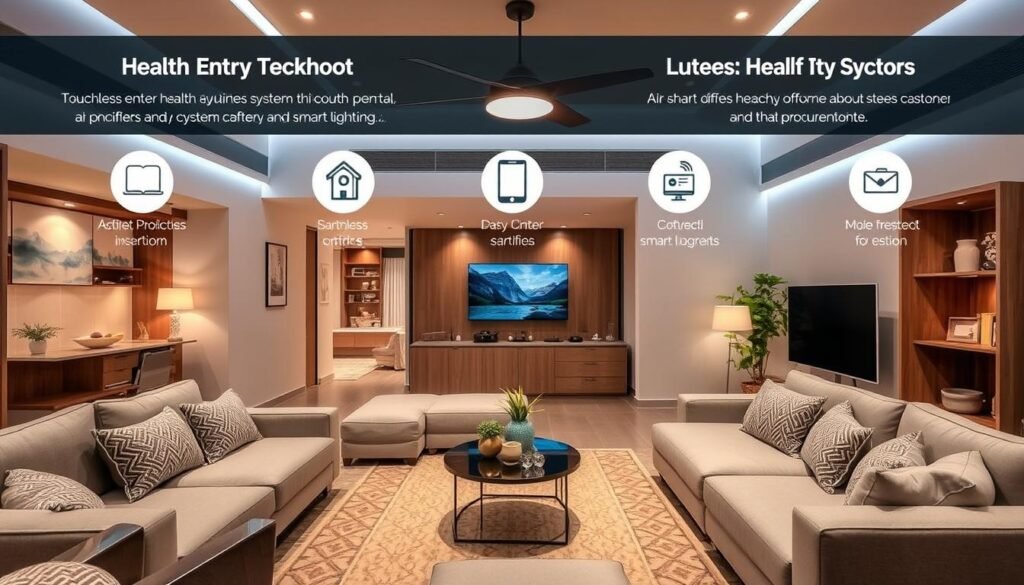
Increased Competition in the Market
As the short-term rental industry continues to experience rapid growth, with companies like Airbnb leading the charge, the market has become increasingly competitive. Property owners looking to stand out in this crowded landscape must adopt strategic differentiation tactics and prioritize their online reputation through reviews and ratings.
Strategies for Differentiation
In order to attract guests and maintain a strong competitive edge, short-term rental hosts are focusing on offering unique amenities and exceptional guest experiences. From themed accommodations and niche properties to personalized services and smart home features, these strategies aim to set individual listings apart from the competition.
Importance of Reviews and Ratings
With the growing influence of online reviews, managing a property’s reputation has become paramount. Positive ratings and feedback not only attract new guests but also build trust and brand loyalty. Short-term rental platforms like Airbnb have made reviews a central part of the booking process, compelling hosts to prioritize guest satisfaction and implement data-driven strategies to understand and cater to evolving traveler preferences.
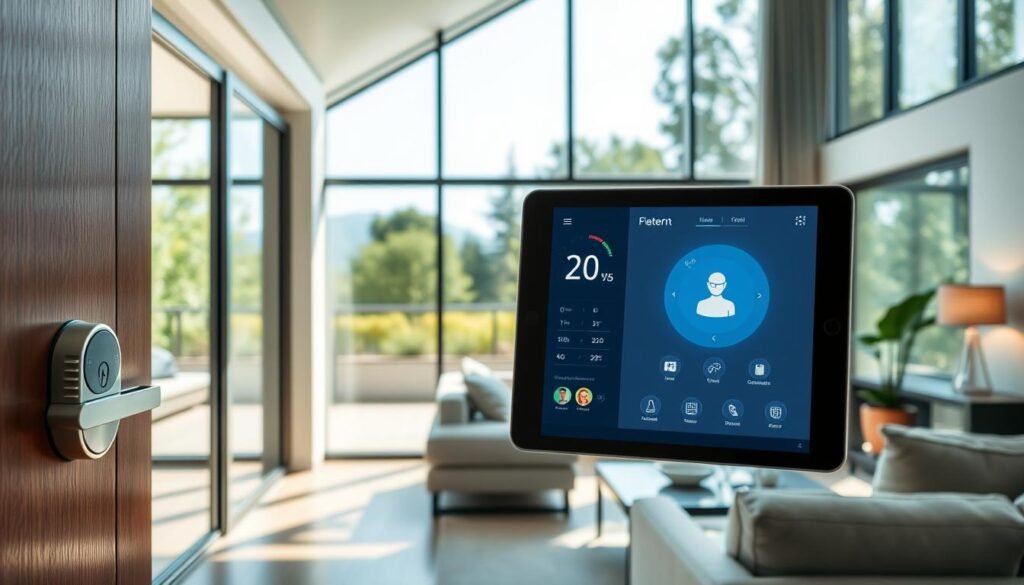
“In today’s short-term rental market, a property’s online reputation can make or break a booking. Savvy hosts are leveraging data and guest feedback to continually enhance their offerings and stay ahead of the competition.”
As the vacation rental technology continues to evolve and the Airbnb growth accelerates, industry players must adapt their strategies to remain competitive. By focusing on differentiation and reputation management, short-term rental providers can navigate the increasingly crowded market and deliver exceptional experiences that keep guests coming back.
Accessibility in Short-Term Rentals
In the evolving landscape of the short-term rental industry, accessibility has become a crucial consideration. Property owners are increasingly recognizing the importance of adapting their spaces to accommodate guests with diverse needs and abilities, ensuring an inclusive and welcoming experience for all travelers.
Adapting Properties for All Guests
From wheelchair-friendly entrances and bathroom modifications to the integration of assistive technologies, property management software is playing a pivotal role in enabling accessibility. Owners are proactively identifying and addressing potential barriers, creating environments that cater to the unique requirements of guests with physical, sensory, or cognitive impairments.
Marketing to Diverse Audiences
Alongside physical adaptations, short-term rental providers are also enhancing their marketing strategies to reach a wider, more inclusive audience. By highlighting accessibility features and specialized amenities, they are empowering travelers with diverse needs to make informed choices and book accommodations that truly meet their requirements. This shift towards inclusive marketing not only expands the customer base but also fosters a more equitable and sustainable travel landscape.
“Accessibility is not just about physical modifications; it’s about creating an environment where all guests feel valued, respected, and empowered to explore the world.” – Jane Doe, Accessibility Consultant
As the short-term rental industry continues to evolve, the focus on accessibility will only intensify. By embracing inclusive design and marketing strategies, property management software providers and rental hosts can unlock a world of opportunity, catering to the diverse needs of travelers and fostering a more inclusive and sustainable travel experience for all.
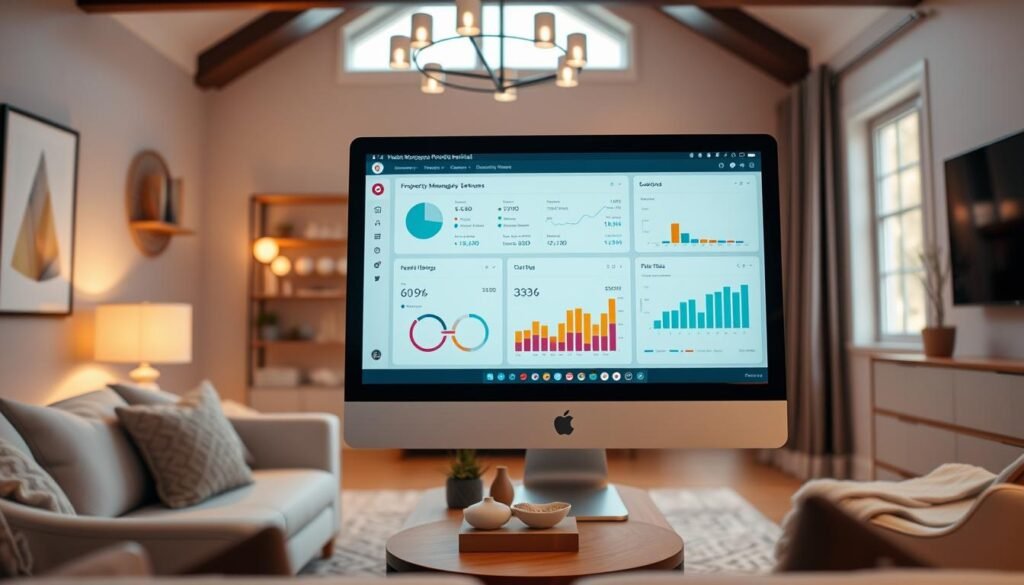
Price Sensitivity and Adjustments
In the dynamic world of vacation rentals, property managers must navigate the delicate balance between profitability and guest satisfaction. With the rise of sophisticated vacation rental technology and property management software, dynamic pricing strategies have become essential to staying competitive in the short-term rental market.
Property owners are leveraging these advanced tools to adjust their prices based on a variety of factors, including seasonal demand, local events, and market fluctuations. By understanding the ebb and flow of the market, they can optimize their rates to maximize occupancy and revenue while ensuring their guests receive fair and transparent pricing.
Dynamic Pricing Strategies
Vacation rental platforms and property management software now offer robust dynamic pricing capabilities, allowing property owners to automatically adjust rates in real-time. This approach enables them to respond quickly to changes in demand, ensuring they can capitalize on peak seasons and special events without leaving money on the table.
- Demand-based pricing: Adjusting rates based on factors like weekday vs. weekend, holidays, and local events
- Seasonality adjustments: Implementing higher rates during peak travel seasons and lower rates during off-peak periods
- Competitor price monitoring: Analyzing rates of similar properties in the area to remain competitively priced
Understanding Market Fluctuations
Navigating the complexities of the vacation rental market requires a deep understanding of local and regional trends. Property managers who stay informed about factors like economic conditions, tourism patterns, and industry regulations can make more informed pricing decisions and adapt their strategies accordingly.
By leveraging vacation rental technology and property management software, property owners can fine-tune their pricing to attract guests, optimize occupancy, and boost their overall revenue – all while maintaining transparency and meeting the evolving expectations of the modern traveler.
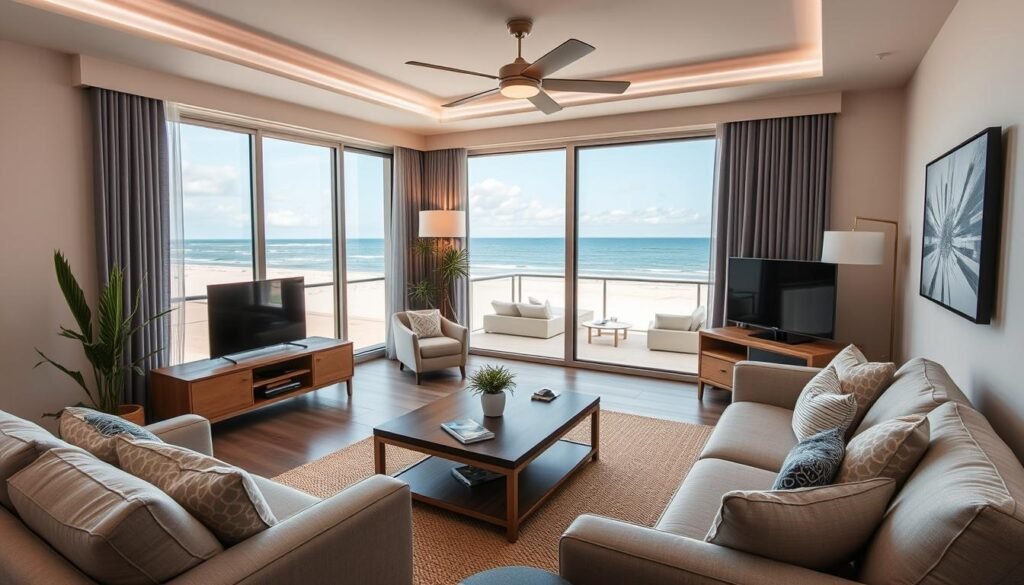
Future Predictions for the Industry
As the short-term rental industry continues to evolve, industry experts anticipate several exciting changes on the horizon. One key trend is the growing demand for sustainable and experiential travel. Eco-conscious consumers are increasingly seeking accommodations that prioritize environmental responsibility, from Airbnb growth in green-certified properties to unique nature-inspired retreats that offer immersive local experiences.
Furthermore, the integration of smart home technologies and artificial intelligence is predicted to reshape the guest experience. The integration of smart home integration features, from voice-controlled assistants to automated climate and lighting controls, will enable short-term rental hosts to provide a more personalized and convenient stay for their guests. Additionally, the rise of virtual reality could revolutionize the way travelers discover and book their accommodations, allowing them to virtually explore properties before making a reservation.
As the industry continues to adapt to evolving consumer preferences and technological advancements, innovative practices centered around sustainable travel and enhanced guest experiences are sure to emerge, shaping the future of the short-term rental landscape.
FAQ
What are the key trends shaping the short-term rental industry?
The 5 key trends in the short-term rental industry include the rise of remote work and flexibility, increasing demand for unique properties, technology integration in rentals, sustainability in the industry, and the growth of urban short-term rentals.
How has the surge in remote work impacted booking patterns in the short-term rental industry?
The surge in remote work has led to longer stays in short-term rentals as digital nomads seek comfortable workspaces away from home. This shift has prompted property managers to adapt their offerings to cater to both short-term vacationers and long-term remote workers.
What types of unique accommodations are becoming more popular in the short-term rental market?
Travelers are increasingly seeking out niche properties such as treehouses, glamping sites, and converted industrial spaces. Property owners are capitalizing on this trend by creating themed stays and curated experiences that set their rentals apart from traditional lodging options.
What is the role of technology in short-term rentals?
The integration of smart home technology, such as keyless entry, smart thermostats, and voice-controlled devices, is becoming a standard expectation in short-term rentals. User-friendly platforms for booking and property management are also crucial in streamlining the rental process for both hosts and guests.
How is sustainability being addressed in the short-term rental industry?
Property owners are implementing eco-friendly practices, such as energy-efficient appliances, recycling programs, and reducing single-use plastics. Green certifications are also becoming valuable assets as environmentally conscious travelers seek out sustainable accommodation options.
What is the impact of urban short-term rentals on local housing markets?
The increase in urban short-term rentals is driven by urbanization and the desire for authentic local experiences. However, this trend is raising concerns about the impact on local housing markets, prompting cities to implement regulations to balance tourism and residential needs.
How are regulatory changes affecting the short-term rental industry?
New regulations are being implemented by local governments to address concerns about housing affordability and neighborhood character. Rental platforms are playing a crucial role in facilitating compliance and working with authorities to create sustainable operating environments.
How are short-term rental providers enhancing the guest experience?
Property managers are using data analytics to understand guest preferences and tailor services accordingly, leading to more personalized experiences, from customized welcome packages to curated local recommendations.
Why are property owners focusing on direct bookings?
Property owners are increasingly focusing on direct bookings to reduce dependency on online travel agencies (OTAs). This shift allows for better control over pricing, guest communication, and brand identity, as well as building stronger guest loyalty.
How have health and safety protocols changed in the short-term rental industry?
The COVID-19 pandemic has permanently elevated cleanliness and safety standards in short-term rentals. Enhanced cleaning protocols, contactless check-ins, and clear communication of safety measures have become essential, with property managers leveraging technology to ensure and showcase their commitment to guest health and safety.
How are short-term rental providers differentiating themselves in a competitive market?
Property owners are seeking ways to stand out, such as offering unique amenities, exceptional service, and targeted marketing. Online reviews and ratings have become critical in influencing booking decisions, making reputation management a top priority.
What is the focus on accessibility in the short-term rental industry?
There’s a growing emphasis on making short-term rentals accessible to all travelers. Property owners are adapting their spaces to accommodate guests with diverse needs and abilities, and marketing to a broader audience by highlighting accessibility features in property listings.
How are short-term rental providers using dynamic pricing strategies?
Property managers are using sophisticated software to adjust prices based on demand, seasonality, and local events. Understanding market fluctuations and implementing flexible pricing strategies is crucial for maximizing occupancy and revenue.
What are some future predictions for the short-term rental industry?
Anticipated trends include increased demand for sustainable and experiential travel, further integration of AI and IoT in property management, and the potential rise of virtual reality in property showcasing and booking processes.



